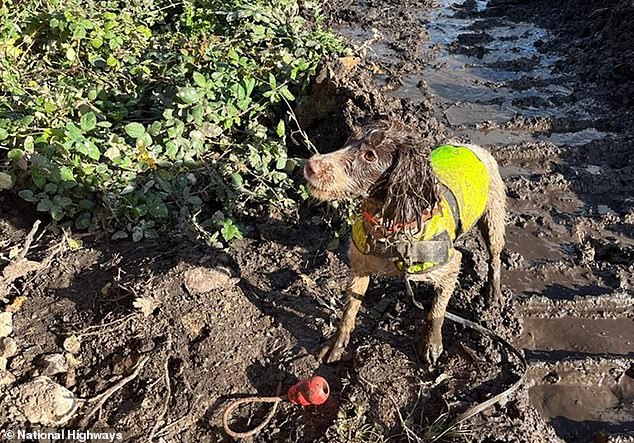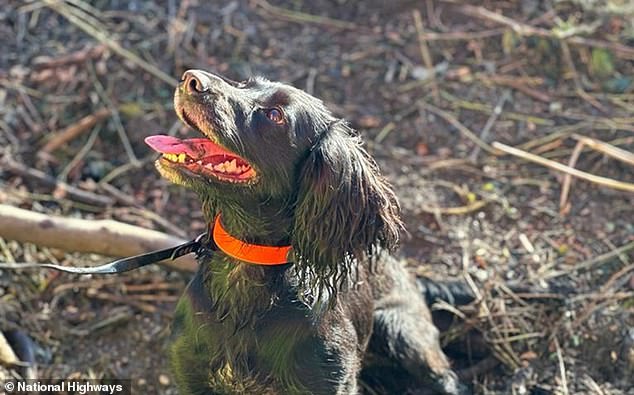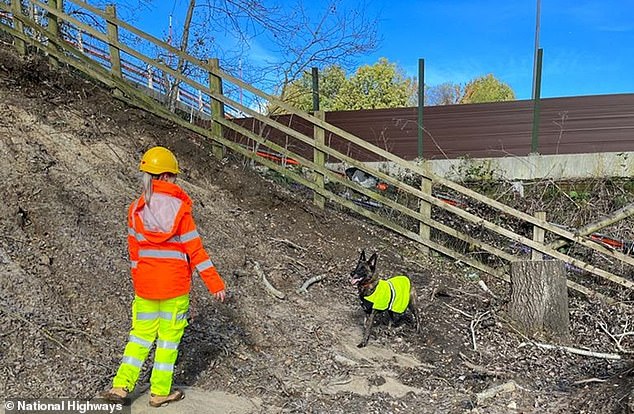Bring in the Japanese knotweed dog-tectives! National Highways enlists the help of three pups to root out the havoc-wreaking weed and stop it spreading along the M25
>
- Japanese knotweed damages buildings and construction sites if left unattended
- The National Highways Corporation has recruited three weed-sniffing dogs on the M25
It has been growing uncontrollably across Britain since its introduction nearly 200 years ago.
But now National Highways has revealed a new force in the battle against Japanese knotweed – man’s best friend.
Three adorable dogs have been recruited to root out these weeds and prevent them from spreading along the M25.
“We decided to put our feet on the pavement and take a unique approach to tackling Japanese knotweed,” said Pippa Jordan, lead environmentalist at National Highways.
“These sniffer dogs are not only adorable, but they are also incredibly skilled at detecting the presence of unwanted plants, especially those that cannot be easily seen.”
It has been growing uncontrollably across Britain since its introduction nearly 200 years ago. But now National Highways has revealed a new force in the battle against Japanese knotweed – man’s best friend

Three adorable dogs have been recruited to root out these weeds and prevent them from spreading along the M25.
Japanese knotweed is a type of plant that has bamboo-like stems and small white flowers.
Native to Japan, this plant is considered an invasive species and was brought to Britain by the Victorians as an ornamental plant in gardens and to line railway lines to stabilize the soil.
Despite its beautiful appearance, Japanese knotweed can cause serious damage to buildings and construction sites if left unattended.
In a bid to prevent its spread on the M25 Junction 10 upgrade, National Highways has enlisted the help of three dogs – Fenix the Dutch Shepherd, Spaniels Nica and Nettled.
Dogs are trained to sniff out rhizomes – the underground parts of a plant such as roots, bulbs and buds.
“Environmental preservation plays an important role in our construction projects,” Ms. Jordan explained.
“Before we begin, we create a map of the area showing nearby plant species allowing us to address any invasive species growing on the construction site.”

When dogs discover Japanese knotweed, they freeze in place. This not only alerts their handlers to their discovery, but also allows National Highways to take action to eradicate the weed

While analyzing the site, the dogs discovered several areas where roots were located underground
When dogs discover Japanese knotweed, they freeze in place.
This not only alerts their handlers to their discovery, but also allows National Highways to take action to eradicate the weed.
“Dogs have an amazing sense of smell and can pick up the scent emanating from the rhizome of Japanese knotweed in the soil,” said Cat Janczor, owner and handler at Canine Detection Solutions.
“They are amazing animals and a great tool in the effort to prevent the spread of these invasive plants in and around the site.”
While analyzing the site, the dogs discovered several areas where roots were located underground.
National Highways has now removed these roots, ensuring that no Japanese weeds will sprout any time soon.
(Tags for translation) Daily Mail
